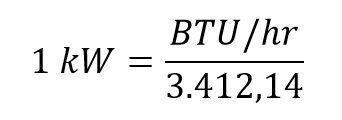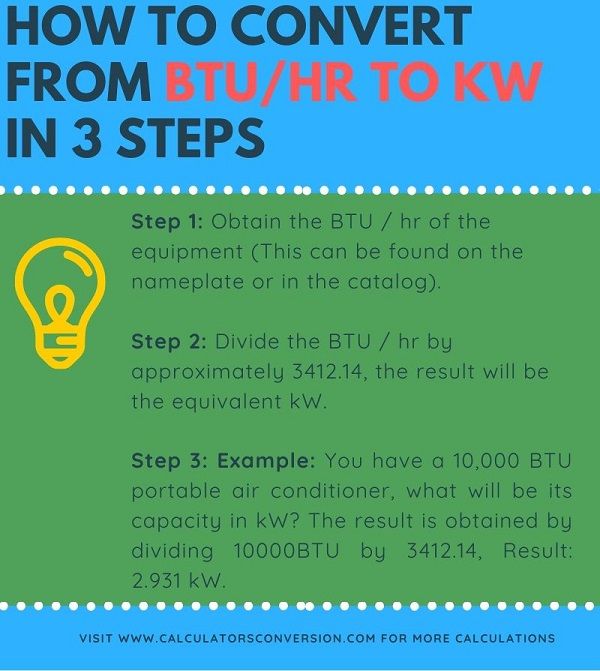This calculator is used to convert BTU/hr to kW, you will also find the definitions, explanation and examples of conversion.
Commonly this BTU/hr to kW ratio is used for air conditioning systems or heaters, the measurement is expressed in terms of how many BTUs per hour the product can add to or remove from the air.
Formula to convert from BTU / hr to kW
Where:
- kW: Unit of measure of power, is the power that we must give to an object of 1 kg so that it moves with acceleration of 1 m / s 2 , this would be the value to find.
- BTU / hr: Unit that is commonly used to denote the power of heating and air conditioning equipment in the English system (United States and England).
How to convert from BTU/hr to kW in 3 steps
To get the kW from BTU/hr, just do the following steps:
- Obtain the BTU/hr of the equipment (This can be found on the nameplate or in the catalog).
- Divide the BTU/hr by approximately 3412.14, the result will be the equivalent kW.
- Example: You have a 10,000 BTU portable air conditioner, what will be its capacity in kW? The result is obtained by dividing 10000BTU by 3412.14, the result is: 2,931 kW.
BTU/hr to kW equivalency table
In this table you will find some equivalences of the most common powers of BTU / hr to kW in air conditioning and heating equipment:
| How many BTU / hr | KW equivalence |
| 5000 BTU/hr | 1,465 kW |
| 6000 BTU/hr | 1,758 kW |
| 7000 BTU/hr | 2,051 kW |
| 8000 BTU/hr | 2,345 kW |
| 9000 BTU/hr | 2,638 kW |
| 10000 BTU/hr | 2,931 kW |
| 12000 BTU/hr | 3,517 kW |
| 14000 BTU/hr | 4,103 kW |
| 15000 BTU/hr | 4,396 kW |
| 18000 BTU/hr | 5,275 kW |
| 20000 BTU/hr | 5,861 kW |
| 21000 BTU/hr | 6,154 kW |
| 22000 BTU/hr | 6,448 kW |
| 23000 BTU/hr | 6,741 kW |
| 24000 BTU/hr | 7,034 kW |
| 25000 BTU/hr | 7,327 kW |
| 30000 BTU/hr | 8,792 kW |
| 34000 BTU/hr | 9,964 kW |
| 36000 BTU/hr | 10,551 kW |
| 40000 BTU/hr | 11,723 kW |
| 48000 BTU/hr | 14,067 kW |
| 60000 BTU/hr | 17,584 kW |
| 120000 BTU/hr | 35,169 kW |
Commonly 3 kW air conditioners have decent BTUs. Those with 10 kW could easily cool a small house.
BTU and kW definition
BTU definition ‘British Thermal Unit’
BTU denotes the amount of energy to raise 1 pound of water by 1 degree Fahrenheit. Honestly, this sentence only makes sense to the British. For those who are wondering how much it is, it is around 1055 joules. A July, in this case, is the energy that dissipates as heat.
BTU is a measure of energy, not power. To get power, we have to use some kind of time unit like time, for example: ‘This air conditioner can produce 10,000 BTUs of power per hour.’
Let’s say we have an air conditioner with a capacity of 10,000 BTUs. That is a simplified description. In fact, we have an air conditioner that is capable of producing 10,000 BTUs per hour. The correct unit here is BTU / h.
History / Origin: The British Hourly Thermal Unit is based on the British Thermal Unit (symbol: Btu or BTU), a traditional United States traditional heat unit, where heat is a type of energy transfer in which the energy moves from A colder substance. BTU is specifically defined as the amount of heat required to increase the temperature of one pound of water by one F. It has several different definitions, all of which equal approximately 1,055 joules.
Current use: The British hourly thermal unit is not a widely used unit. Multiples of watt hours, often kilowatt hours, are used more frequently than Btu / h, even in the United States.
KW definition
kW is the basic unit of power (in the metric system used by Europeans) and is basically the amount of power that we have to give to a 1 kg object to start moving with an acceleration of 1 m / s2. Kilowatts are only 1000 watts (watts). This phrase makes sense to Europeans who know a little bit of physics.
The base unit of the kilowatt is the watt, named after Scottish inventor James Watt. As is consistent with SI units, the prefix kilo means that one kilowatt equals one thousand watts or one thousand joules per second.
History / Origin: The base unit of the kilowatt is the watt, which is named after a Scottish inventor named James Watt. This was first proposed in 1882 by Sir Charles William Siemens, an engineer and entrepreneur, who suggested the use of the Watt name as a unit of power. He defined unity within the system of units in use at the time, and his definition was adopted in 1908.
Current usage: Kilowatts are used worldwide, generally to express the output power of motors and the power of electric motors, tools, machines, and heaters. The electricity used by a home is generally measured in kilowatt hours, or kWh, meaning 1,000 watts is applied over a period of one hour. Megawatts or gigawatt hours can be used in larger buildings or for industrial applications.


